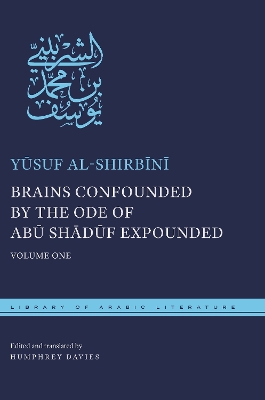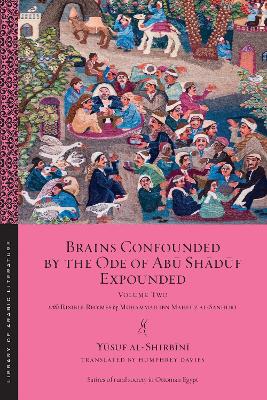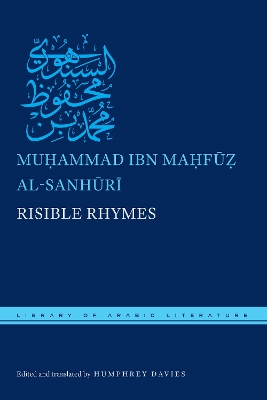Library of Arabic Literature
3 total works
Unique in pre-twentieth-century Arabic literature for taking the countryside as its central theme, Yusuf al-Shirbini's Brains Confounded combines a mordant satire on seventeenth-century Egyptian rural society with a hilarious parody of the verse-and-commentary genre so beloved by scholars of his day.
In Volume One, al-Shirbini describes the three rural "types"-peasant cultivator, village man-of-religion and rural dervish-offering numerous anecdotes testifying to the ignorance, dirtiness, illiteracy, lack of proper religious understanding, and criminality of each. He follows it in Volume Two with a 47-line poem supposedly written by a peasant named Abu Shaduf, who charts the rise and fall of his fortunes and bewails, above all, the lack of access to delicious foods to which his poverty has condemned him. Wielding the scholarly tools of elite literature, al-Shirbini responds to the poem with derision and ridicule, dotting his satire of the ignorant rustic with numerous digressions into love, food, and flatulence.
Witty, bawdy, and vicious, Brains Confounded belongs to an unrecognized genre from an understudied period in Egypt's Ottoman history, and is a work of outstanding importance for the study of pre-modern colloquial Egyptian Arabic, pitting the "coarse" rural masses against the "refined" and urbane in a contest for cultural and religious primacy, with a heavy emphasis on the writing of verse as a yardstick of social acceptability.
A bilingual Arabic-English edition.
Brains Confounded by the Ode of Abu Shaduf Expounded, with Risible Rhymes
by Yusuf al-Shirbini and Muhammad ibn Mahfuz al-Sanhuri
Witty, bawdy, and vicious, Yusuf al-Shirbini's Brains Confounded pits the "coarse" rural masses against the "refined" urban population. In Volume One, al-Shirbini describes the three rural "types"-peasant cultivator, village man-of-religion, and rural dervish-offering anecdotes testifying to the ignorance, dirtiness, and criminality of each. In Volume Two, he presents a hilarious parody of the verse-and-commentary genre so beloved by scholars of his day, with a 47-line poem supposedly written by a peasant named Abu Shaduf, who charts the rise and fall of his fortunes. Wielding the scholarly tools of elite literature, al-Shirbini responds to the poem with derision and ridicule, dotting his satire with digressions into love, food, and flatulence.
Volume Two of Brains Confounded is followed by Risible Rhymes, a concise text that includes a comic disquisition on "rural" verse, mocking the pretensions of uneducated poets from Egypt's countryside. Risible Rhymes also examines various kinds of puzzle poems, which were another popular genre of the day, and presents a debate between scholars over a line of verse by the fourth/tenth-century poet al-Mutanabbi. Together, Brains Confounded and Risible Rhymes offer intriguing insight into the intellectual concerns of Ottoman Egypt, showcasing the intense preoccupation with wordplay, grammar, and stylistics and shedding light on the literature of the era.
An English-only edition.
Written in mid-seventeenth-century Egypt, Risible Rhymes is in part a short, comic disquisition on "rural" verse, mocking the pretensions and absurdities of uneducated poets from Egypt's countryside.
The interest in the countryside as a cultural, social, economic, and religious locus in its own right that is hinted at in this work may be unique in pre-twentieth-century Arabic literature. As such, the work provides a companion piece to its slightly younger contemporary, Yusuf al-Shirbini's Brains Confounded by the Ode of Abu Shaduf Expounded, which also takes examples of mock-rural poems and subjects them to grammatical analysis. The overlap between the two texts may indicate that they both emanate from a common corpus of pseudo-rural verse that circulated in Ottoman Egypt. Risible Rhymes also examines various kinds of puzzle poems-another popular genre of the day-and presents a debate between scholars over a line of verse by the fourth/tenth-century poet al-Mutanabbi.
Taken as a whole, Risible Rhymes offers intriguing insight into the critical concerns of mid-Ottoman Egypt, showcasing the intense preoccupation with wordplay, grammar, and stylistics that dominated discussions of poetry in al-Sanhuri's day and shedding light on the literature of this understudied era.
A bilingual Arabic-English edition.


